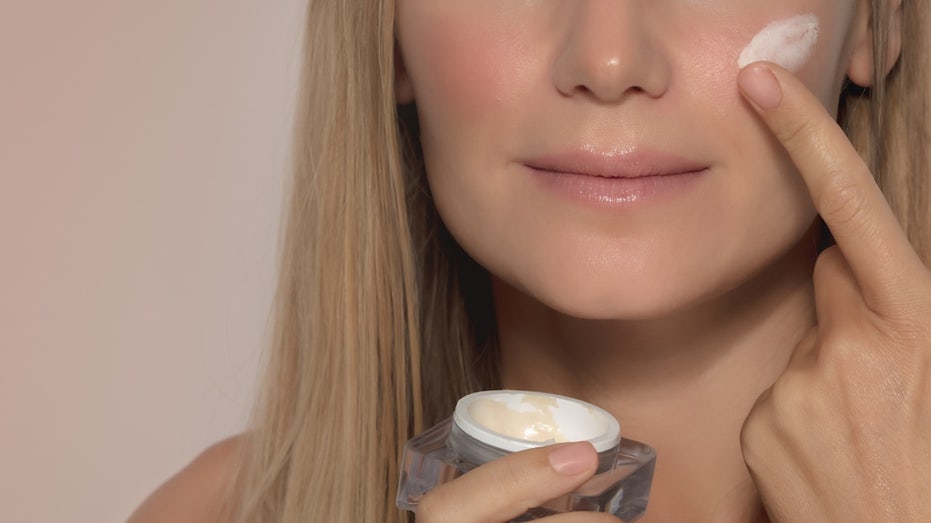
Tallow balm maker and natural cosmetics brand Hearth and Homestead has seen a major rise in demand for beef tallow products. Experts weigh the potential benefits and risks.
Rubbing beef fat on your face is one of the newest skincare fads.
Beef tallow is currently trending on social media as an alternative to traditional skincare products.
The simple-ingredient balms are made from the fat surrounding the kidneys of cows and processed into a butter that can be used as a moisturizer.
AIRPLANE PASSENGERS GO VIRAL FOR MID-FLIGHT BEAUTY ROUTINES: DERMATOLOGISTS WEIGH IN
While many might turn up their noses to using an animal-based product on the face, natural skincare company Hearth and Homestead in Virginia sold out of its tallow balm product on Black Friday.
Lily Wilmoth, the company’s founder and president, spoke with Fox News Digital in an on-camera interview about the skyrocketing demand for beef tallow.
“It’s bigger than ever,” she said. “The biggest product for us has always been our tallow-based skincare products.”
Wilmoth revealed that her tallow balm is made from 100% grass-fed beef suet, or the fat that encases a cow’s kidney, which is sourced from farms across the country.
The fat is harvested, ground into a butter consistency and blended with an herb-infused olive oil before being melted, whipped, cooled and jarred, she said.
‘I’M A PHARMACIST, AND I WOULDN’T TAKE THESE 3 VITAMIN SUPPLEMENTS’
“It’s not the back fat or other types of fat that you might find on your steak,” Wilmoth said. “It’s a very specific fat … our ancestors recognized that this fat was special.”
“It has a higher amount of nutrients than all the other fats in the animal,” she went on. “It’s very creamy and white in texture. It doesn’t have a weird smell or taste.”
This specific fat is where nutrients, including vitamins D and A, are stored, according to Wilmoth.
“Our skin is an organ,” Wilmoth said. “That’s why it’s so important that anything we put on our skin should be something we’re really thinking about carefully.”
Some moisturizers on the market have a “long list of complex ingredients, preservatives, emulsifiers … fragrances and dyes,” which could worsen skin conditions like eczema and acne, she cautioned.
“Tallow balm, which is oil-based, doesn’t need preservatives because it doesn’t contain water,” she said. “It’s not going to disrupt the natural skin barrier.”
While tallow balm is “not a healing remedy” and each person’s skin will react to it differently, Wilmoth noted that many customers say it helps with conditions like acne and psoriasis.
Dr. Brendan Camp, a New York-based dermatologist, agreed that beef tallow is “generally well-tolerated” by most skin types.
He confirmed that beef tallow acts as a moisturizer to help “trap water into the skin” and make it feel “smooth and soft.”
“As an emollient, beef tallow fills in cracks and crevices in the skin that contribute to a rough texture,” he said to Fox News Digital.
Beef tallow also contains omega-3 fatty acids and various vitamins, Camp noted, which help maintain the health of the skin barrier and protect it from “oxidative stress.”
Wilmoth admitted that she “cannot guarantee that every single person is going to see amazing results with tallow,” as every person’s microbiome is different.
“Depending on your particular skin type, you may find that something else works better for you,” she said.
People with oily skin may find beef tallow products to be “too heavy or greasy,” Camp cautioned.
TANNING PILLS CAN POSE SERIOUS DANGERS, DERMATOLOGISTS WARN: ‘CONSUMERS SHOULD BE AWARE’
“If you have sensitive skin, you may want to consider doing a patch test on the inside of your arm prior to using it more liberally on the skin,” he recommended.
For those who opt not to use beef tallow, Camp suggested trying other basic moisturizers that are free of fragrances and dyes and that contain hydrating ingredients like ceramides, glycerin, hyaluronic acid and squalane.
He also noted that, like most over-the-counter supplements, beef tallow products are not FDA-regulated.
In a video posted to Instagram and shared with Fox News Digital, Dr. Tiina Meder — a cosmetic safety expert, dermatologist and founder of Meder Beauty in London — questioned the hype around tallow balm.
CLICK HERE TO SIGN UP FOR OUR HEALTH NEWSLETTER
Meder, who grew up in Estonia in the 1970s, shared that her mother applied beef tallow to her face and hands in the cold winters because there weren’t any other options.
“It was the only thing to protect children’s faces and hands from cold burn,” she said.
But Meder wondered why people would choose not to take advantage of the variety of creams and moisturizers available today that are “better than beef tallow.”
For more Health articles, visit foxnews.com/health
“Beef tallow is not bioidentical,” she said. “Beef tallow lipids have very little in common with lipids of the human skin.”
Linoleic acid, which is found in human sebum glands, is particularly essential for skin health, Meder noted, as it’s an anti-inflammatory antioxidant and also promotes viscosity — but beef tallow doesn’t contain any.
Meder added that other lipids found in beef tallow can be pro-inflammatory for humans and can “sensitize the skin.”
“It is simply not right to apply beef tallow on the skin when you have such a huge choice,” she said.





